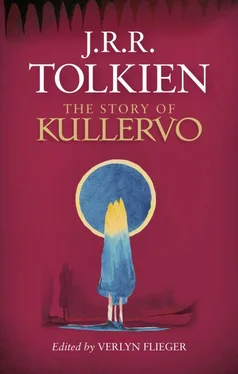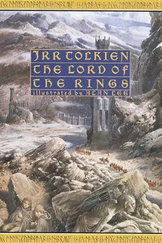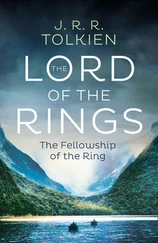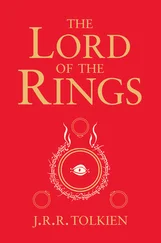[ The verse breaks off here without closing punctuation or any indication that more is intended. ]
But Sāri went away and there she died — the daughter of Koi even the fair one whom Āsemo the smith primeval wooed in far Lohiufor seven years. And her cries reached her husband at his forge and he turned from the smithy and went to listen in the lane and then with fear at his heart hastened and looked about the yard and the distant sound of piping shrill and strange faring away out over the marshland under the stars came to his ears and nought else, but to his eyes came soon that evil sight upon the ground and his soul was darkened deeper than the night and starless. But Sāri was far abroad in the wild with pipe of bone and no man might follow for Mauri’s magic was about him. And his own magic ever waxing went with him too.
And he wandered onwards aimlessly forward for that night and a day through thickest woodland till the next night he found himself in the densest timber grounds of Pūhu and it grew stifling dark and he flung himself on the ground and reflected bitterly.
Wherefore have I been created?
Who has made me and has doomed me
Thus ’neath sun and moon to wander
’Neath the open sky forever?
Others to their homes may journey
That stand twinkling in the even
But my home is in the forest.
In the wind halls must I slumber
And in bitter rain must bathe me
And my hearth is midst the heather
In the wide halls of the wind blast
In the rain and in the weather.
Never Jumala most holy
In these ages of the ages
Form a child thus crooked fated
With a friendless doom forever
To go fatherless ’neath heaven
And uncared by any mother
As thou, Jumala, hast made me
Like a wailing wandering seagull,
Like a seamew in the weather
Haunting misty rocks and shoreland
While the sun shines on the swallow
And the sparrow has its brightness
And the birds of air are joyous
But that is never never happy.
I Sāri am not happy.
O Ilu, life is joyless.
{ I was small and lost my motherfather
I was young (weak) and lost my mother.
All my mighty race has perished
All my mighty race}
Then into his heart Ilu sent a thought: and he lifted his head and said ‘I will slay Ūlto.’ And the thought of his father’s wrong and his oath and the tears of his whole lifetime came to him and he said ‘Gladly will I slay Ūlto.’ And as yet was his heart bitter against his own folk too, save Oanōra only, and he thought him fiercely of the red light leaping from Untamo’s dwellings and Untamo lying dead on the stained floor of his own grim halls: but Kullervo knew not his way thence for on every side the forest encompassed him; still he fared onward saying ‘wait thou, wait thou Untamoinen destroyer of my race; if I find thee then quickly will thy dwelling leap up in flames and the farmlands lie empty and withered.’
As he fared musing an old dame, even the Blue-robed Lady of the Forestmet him asking him ‘Whither O Kullervo son of Kalervo goest thou so hastily?’
Then Kullervo told her of his desire to quit the forest and wander to the homeland of Untamo and with fire avenge his father’s death and his mother’s tears.
Then said she, ‘Easy it is for thee to journey though the track be not known to thee through the forest. Thou must follow the river’s path and march for two days and a third day when turning to the Northwest thou wilt find a wooded mountain. Fare not towards it lest ill find thee. March on under the shadow often bending to the left when thou comest to another river and when thou hast followed its banks soon thou wilt strike a fair spot and a great glade and over a great leap a triple waterfall foaming. Then you will know thou art halfway. Even so thou must continue pushing up the river toward its source: and the ground will slope against thee and the wood darken and lie in again till for a day you stumble across bleak waste and then soon wilt thou see the blue of woods of Untamo rising afar off: and mayhap these thou hast not yet quite forgotten.’
Then slipped the Woman of the Forestaway among the tree boles and Kullervo following the river — for one not very great was nigh — marched for two days and a third day, then turned to Northwest and espied the wooded mountain. And the sun shone upon it and the trees bloomed and the bees seemed a-humming there and the birds singing, and Kullervo tired of the blue shadows of the wood and thought — my quest will wait, for never can Untamo in the end escape me: I will go drink the sunlight and he turned from the forest path into the sun; and was going up the slopes till he came to a wide clearing and on a fallen log in a patch of light amidst the brambles he saw a maiden with her yellow hair all flowing. And the curse of Louhi’s daughterwas on him and his eyes saw and saw not: and he forgot the slaying of Untamo and strode to the maiden who heeded him not. A garland of flowers was she plaiting and was singing yet wearily and half-sorrowfully to herself.
‘O fair one, pride of Earth,’ said Kullervo, ‘come with me; wander in the forest with me unless indeed thou be a daughter of Tapioand no human maiden: but even so do I desire thee to be my comrade.’
And the maid was affright and shrank from him. ‘Death walketh with thee, wanderer, and woe is at thy side.’
And Kullervo was wroth; but very fair was the maiden and he said ‘’Tis not good for thee to be alone in the forest; nor does it please me; food will I bring thee and fare abroad to lay and lie in wait for thee, and gold and raiment and many things of cost will give thee.’
‘Though I be lost in the evil woods, and Tapiohas me fast in his hold,’ said she, ‘yet would I never wish to roam with such as thee, villain. Little does thy look consort with maidens. But thou wouldst, an thou were honest aid me to find the homeward road to my folk which Tapio hides from me.’
But Kullervo was wroth in that she had reviled his ungainliness, and put kind thought from him and cried: ‘Lempo seize thy folk and swift would I put them to the sword didst I come upon them, but thou I wilt have, nor shalt thou dwell in thy father’s house again.’
Whereat she was adread and sped like a wild thing of the woods through the tangle from him and he angry after her: till he laid hands upon her and bore her in his arms away in the depths of the woods.
Yet was she fair and he loving with her, and the curse of the wife of Ilmarinen[ sic ] upon them both, so that not long did she resist him and they abode together in the wild till on a day even as Jumala brought the morning, the damsel resting in his arms spake unto him questioning him and said,
Tell me now of all thy kinfolk
Of the brave race that thou springst from:—
Yea, a mighty race it seems me
Thine is, and a mighty father.
And Kullervo’s answer was thus:
[ These lines are offset apparently to indicate a change in speaker. ]
Nay my race is not a great one
Not a great one nor a small one:
I am just of middle station;
Kalervo’s unhappy offspring
Uncouth boy and ever foolish
Worthless child and good for nothing.
Nay but tell me of thy people
Of the brave race whence thou comest.
Maybe a mighty race has born thee
Fairest child of mighty father.
And the girl answered quickly (nor let Kullervo see her face),
Nay my race is not a great one
Not a great one nor a small one
I am just of middle station
Wandering maiden ever foolish
Worthless child and good for nothing.
Then stood she up and gazing in woe at Kullervo with outstretched hand and her hair falling about her cried,
Читать дальше












